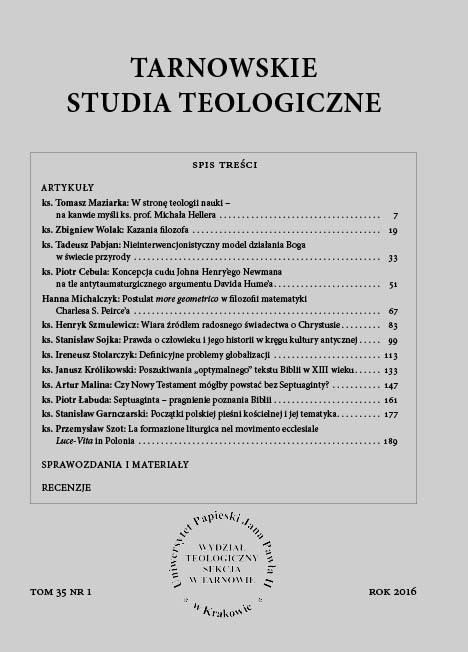Czy Nowy Testament mógłby powstać bez Septuaginty?
DOI:
https://doi.org/10.15633/tst.1720Słowa kluczowe:
Septuaginta, Nowe Przymierze, kanon Biblii, List do HebrajczykówAbstrakt
The New Testament texts depend on the Septuaginta translation for the grammar and vocabulary that they use. The influence is shown by the numerous quotations according to the most ancient translation of the Old Testament. The relationship between the two main parts of the Bible lies in the common content shared by the authors of their books. The present paper describes the dependence of the name “New Testament” on the Septuagint and demonstrates that its openness favored the reception of the Christian message.Bibliografia
Euzebjusz z Cezarei, Historia kościelna. O Męczennikach palestyńskich, tłum. A. Lisiecki, Poznań 1924.
Fernández Marcos N., La Bibbia dei Settanta. Introduzione alle versioni greche della Bibbia, Brescia 2000 (rozdział 21: I LXX e il Nuovo Testamento).
Goswell G., The order of the books in the Greek Old Testament, „Journal of the Evangelical Theological Society” 52 (2009) no. 3, s. 465–466.
Harl M., La Septante aux abords de l’ère chrétienne. Sa place dans le Nouveau Testament, [w:] La Bible grecque des Septante: Du judaïsme hellénistique au christianisme ancien, ed. G. Dorival, M. Harl, O. Munnich, Paris 1994, s. 269–288.
Jellicoe S., Septuagint studies in the current century, „Journal of Biblical Literature” 88 (1969), s. 191–199.
Manzi F., Lettera agli Ebrei, Roma 2000.
Septuaginta, czyli Biblia Starego i Nowego Testamentu wraz z księgami deuterokanonicznymi i apokryfami, tłum. R. Popowski, Warszawa 2013.
Stock S. G., Grammar of Septuagint Greek. With selected reading, vocabularies and updated indexes, Boston 1995.
Pobrania
Opublikowane
Numer
Dział
Licencja
Prawa autorskie (c) 2016 Artur Malina

Utwór dostępny jest na licencji Creative Commons Uznanie autorstwa 4.0 Międzynarodowe.
Autorzy publikujący w czasopiśmie udzielają jego wydawcy zgody o następującej treści:
- Autor zachowuje autorskie prawa majątkowe do utworu, a jednocześnie udziela wydawcy czasopisma zgody na jego pierwszą publikację w wersji drukowanej i wersji online na licencji Creative Commons Uznanie autorstwa 4.0 Międzynarodowe oraz zgody na wykonywanie opracowań, w tym przekładów.
- Autor ma możliwość udzielania zgody niewyłącznej na opublikowanie utworu w wersji, która ukazała się w czasopiśmie (np. zamieszczenia go w repozytorium instytucjonalnym lub opublikowania w książce), wraz z informacją o jego pierwszej publikacji w czasopiśmie.
- Autor może umieścić swój utwór online (np. w repozytorium instytucjonalnym lub na swojej stronie internetowej) jeszcze przed zgłoszeniem utworu do czasopisma.

